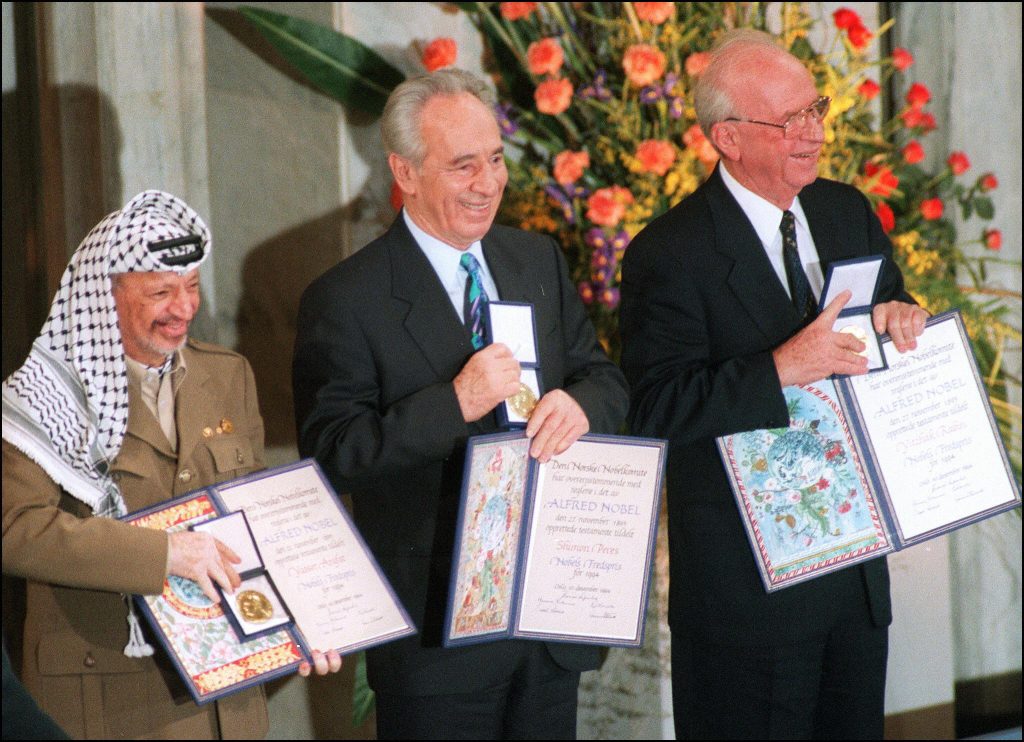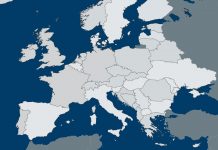By Jacob L. Shapiro
We do not normally deal with individual leaders. When we do, it is to note the constraints on their actions, not their capacity to bend the forces that shape the world in accordance to their will. Political power is often mistaken for the ability to reshape the world or to select courses of action from a menu of options. Political power really just means you are the top of the food chain of your own limited community or group. It is human to ascribe abilities to public figures beyond their actual capacities because the illusion of control is deeply seductive – we want to believe that we can control what we can’t, or at least that if we can’t control it, someone can. But occasionally we note the passing of unique individuals, both because studying them reveals a deeper truth about geopolitics, and because there are global statesmen who, for better or for worse, really do matter. Shimon Peres was such a man, and he died yesterday at the age of 93.

Many will reflect on Peres’ controversial career, on his achievements and foibles, in the coming days. What I can add is a sense of the enormity of the change this man witnessed and was a part of in his long life. He was an example of how powerless individuals are and paradoxically how much individuals can shape events with a lot of effort and an even greater amount of luck. Peres lived long enough to become an anachronism. Many describe him as Israel’s elder statesman and best ambassador. To me he was a ghost of a past that increasingly few people witnessed personally. Peres was not born an Israeli and did not become one until 1948. He was born in Europe when Europe was at a crossroads, and he died in an Israel that stands at a crossroads of its own. His life teaches us much about both.
Peres was born in Wiszniew, Poland (which is now Visnieva, Belarus) in 1924. Ezra Mendelsohn, a highly respected scholar of Jewish history, once described the period between World War I and World War II as “a golden age” for European Jewry. That may seem a strange notion on the surface, because life wasn’t exactly easy for Jews – they faced persecution, violent pogroms and compulsory military service, among other challenges. Jews were one of the many minority groups in Europe that were on the outside looking in. As nationalism rose to become the dominant political ideology on the Continent, so did the suspicion that Jews could never truly assimilate because they were a nation apart. Europe’s concerns are not so different today when it comes to the migration debate.
In part because of the creativity this cognitive dissonance fostered, the four centuries that preceded World War II were a period of tremendous vibrancy for European Jewry. Some Jews wielded very real political and economic power – Holy Roman Emperor Leopold I, for instance, couldn’t have fought his various wars against France or held off the Ottoman siege of Vienna in 1683 had not his “Court Jew” supplied his armies with food, clothing and gunpowder. Some Jews assimilated into their surrounding societies more than they ever thought possible, others either reformed or revitalized the Jewish faith. In the east, where Peres was born, many of European Jewry’s most transformative movements were born. Zionism is the most well-known, but there were many others (Hasidism and the Haskalah, just to name a couple). Not to mention that Jews were by and large responsible for the production of much of the Continent’s liquor.
It was into this golden age that Peres was born. In 1924, roughly 3 million Jews lived in Poland, and on the eve of World War II, there were close to 17 million Jews in the world, most of whom lived in Europe. Jewish law and culture defined the very rhythm of life in many Eastern European towns, shtetls, villages and parts of major cities.
Peres came from a family of Zionists, which is to say he came from a family that subscribed to a fairly novel form of Jewish nationalism that sought self-determination for the Jewish people in Palestine. Zionism was and is a European phenomenon, made of the same stuff as all the European nationalist movements of the 18th and 19th centuries. The only difference was that the land for the nation wasn’t actually in Europe. And this is where Peres’ story veers away from Europe. Peres’ father eventually immigrated to Palestine in 1932, and Peres and the rest of his immediate family joined in 1934.
In Palestine, Peres became a prototypical socialist Zionist, which was the dominant political ideology of Israel for decades. Peres never had the illustrious military career that many of his peers did. After joining the fledgling Haganah, a Jewish paramilitary organization in Palestine that would eventually become the backbone of the Israel Defense Forces, Israel’s founding father, David Ben-Gurion, put Peres in charge of arms purchases. Peres would go on to become one of Ben-Gurion’s acolytes and would have a long and topsy-turvy political career that included multiple stints as a (relatively unsuccessful) prime minister, a Nobel Peace Prize and a term as president before leaving politics in 2014.
Peres is most often associated with two other towering figures in Israeli history, Yitzhak Rabin and Ariel Sharon. Peres shared his Nobel Peace Prize with Rabin, and took over as prime minister after Rabin’s assassination in 1995. In 2005, he left the Labor Party to join Sharon’s Kadima party, only to watch Sharon fall short of his ambitious, unilateral peace plans when felled by a stroke in 2006. There were many differences between Rabin and Peres, or Sharon and Peres, but I think the biggest fundamental difference was that Peres was of Europe, whereas Rabin and Sharon were born and grew up in Palestine. Peres never lost his accent, and I don’t think he ever lost his European-ness, even all these years later.
There are those who will say that Peres’ death marks the end of an era for the state of Israel. But the era to which Peres belonged has been gone for a long time. I say this for two reasons. The first has to do with Europe. Nazi Germany did its work well. Judaism survived the Holocaust – but European Jewry didn’t. Peres was a refugee from Europe and even if he had wanted to could never go back to life as it had been before. On the eve of World War II, almost one in five Jews in the world lived in Poland. Today there are 3,200 left. I hate making the “reducto ad Hitlerum,” as Leo Strauss once termed the rhetorical move to raise Hitler as a boogeyman in argument to silence all disagreement. But it is hard not to when you look around at the rise of nativism, anti-Semitism and anti-Muslim sentiments on the Continent.
The second reason has to do with Israel. The Israel Peres devoted his life to is also in the midst of a transformation. Israel has become a great melting pot of Jews of varying ethnicities and traditions and is forging its own national identity separate from the religious one. But the unity of purpose that pervaded its founding in 1948 is no longer present, and the liberal, secular principles that many of Israel’s founders held now face severe challenges – from those who are apathetic, from the religious Zionists, from the ultra-religious, from those with different ideologies, from the interminably unsolved Israeli-Palestinian conflict. In 1948, the Jews who moved to Israel believed they were fighting for nothing less than the survival of the Jewish people. Now their heirs are fully fledged Israelis and fight for the Israeli way of life to which they have become accustomed, for better jobs and public transportation. They are becoming a nation like any other. Which means Peres began his life as an outsider and became an outsider once again toward the end.
Peres saw the destruction of European Jewry happen before his eyes, and he set out to serve his new nation with all of his heart and all of his soul and all of his might. When it was time to be tough, he tried to be tough. When it was time to acquire weapons, he tried to acquire them. When it was time to make peace, he tried to make peace. He was a man of his word, a word that always accommodated the time he lived in. It is that pragmatism more than anything that defined him and his generation, even when they disagreed with and sometimes even fought each other. They were never comfortable with what they had because they had seen it destroyed once before. Peres was the last whisperer of that voice, that reminder of what human beings are capable of doing to each other, and what they are capable of doing with each other.








